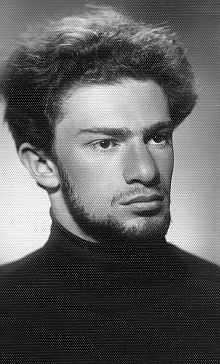Boris Tsirelson
| Boris Tsirelson | |
|---|---|
 Boris Tsirelson while a first-year student, in 1967 | |
| Born |
May 4, 1950 Leningrad |
| Thesis | General properties of bounded Gaussian processes and related questions[1] (1975) |
| Doctoral advisor | Ildar Ibragimov |
| Known for |
Tsirelson's bound Tsirelson space Tsirelson drift Gaussian isoperimetric inequality |
Boris Semyonovich Tsirelson (Hebrew: בוריס סמיונוביץ' צירלסון, Russian: Борис Семенович Цирельсон) is a Russian-Israeli mathematician and Professor of Mathematics in the Tel Aviv University in Israel.
Tsirelson was born in Leningrad to a Russian Jewish family. From his father Simeon's side, he is the great-nephew of rabbi Yehuda Leib Tsirelson, chief rabbi of Bessarabia from 1918 to 1941, and a prominent posek and Jewish leader. He obtained his Master of Science from the University of Leningrad and remained there to pursue graduate studies. He obtained his PhD in 1975.
Later, he participated in the refusenik movement, but only received permission to emigrate to Israel in 1991. Since then, he has been a professor in Tel-Aviv University.
Contributions to mathematics
Tsirelson has made notable contributions to probability theory and functional analysis. They include:
- Tsirelson's bound, in quantum mechanics, is an inequality, related to the issue of quantum nonlocality.
- Tsirelson space is an example of a reflexive Banach space in which neither a l p space nor a c0 space can be embedded.
- The Tsirelson drift, a counterexample in the theory of stochastic differential equations.
- Gaussian isoperimetric inequality (proved by V. Sudakov, B. Tsirelson, and independently by Ch. Borell), stating that affine halfspaces are the isoperimetric sets for the Gaussian measure.